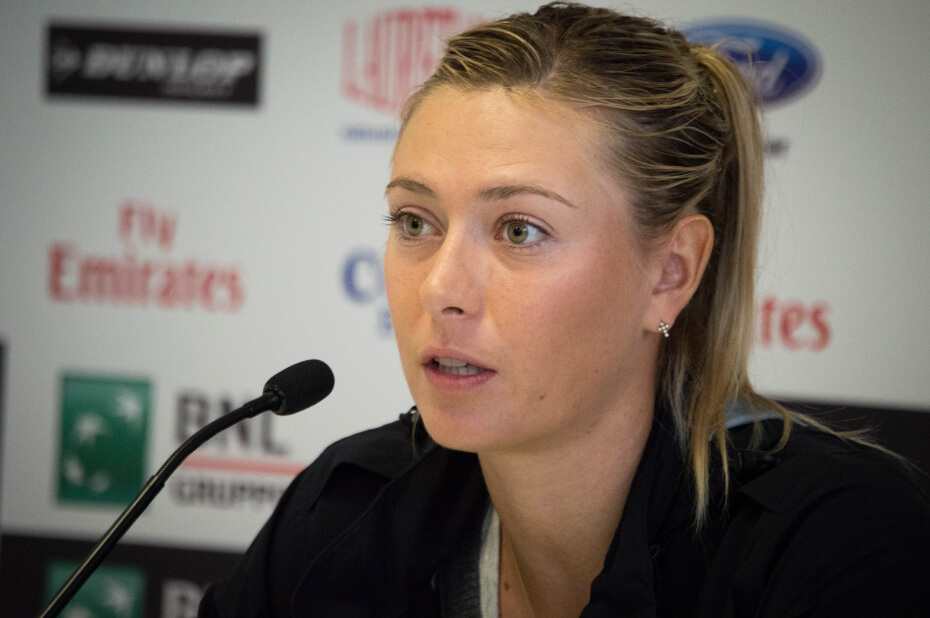Despite the numerous talents and iconic figures the world of women’s tennis has ever produced, some players, unfortunately, earned the unenviable reputation of being the most disliked. Here’s a look at the most hated female tennis players ever.
7. Justine Henin
Justine Henin, a former professional tennis player from Belgium, has been the subject of controversy and dislike for various reasons.
One of the primary incidents that sparked criticism was the infamous “hand incident.” This occurred during a semifinal match at the 2003 French Open against Serena Williams. Henin raised her hand, indicating she wasn’t ready to receive the serve, but the umpire didn’t see it. Williams, assuming her opponent was ready, served and missed. The point was awarded to Henin, who didn’t admit to having raised her hand. This act was perceived as unsportsmanlike and is still mentioned by commentators to this day.
Another controversial incident occurred during the 2006 Australian Open final. Henin retired from the match due to stomach cramps, denying her opponent Amelie Mauresmo the joy of a traditional victory for her first Grand Slam title. Critics questioned Henin’s decision to retire, as she was able to sit for a press conference afterward. Many felt that she should have continued to play and accept her defeat gracefully.
Furthermore, Henin’s performance in 2008 was disappointing to many fans. She was defeated by players such as Dinara Safina and Francesca Schiavone, whom she had previously dominated.
6. Dayana Yastremska
Dayana Yastremska, a young and promising Ukrainian tennis player, has been embroiled in controversies that have led to a certain level of dislike and disdain towards her. The reasons behind this negative sentiment are primarily two-fold: her doping scandal and a controversial act that was perceived as racial insensitivity.
Firstly, Yastremska was provisionally suspended by the World Anti-Doping Agency (WADA) after a banned substance was found in an out-of-competition urine sample she submitted. Despite her claims that the positive test was a result of a contamination event, her appeals to the Court of Arbitration for Sport (CAS) for the suspension to be lifted have been dismissed. This has led to a widespread belief that she may have been involved in the use of performance-enhancing drugs, a serious violation in the world of sports, thereby leading to a significant amount of dislike.
The doping scandal has not only tainted her professional reputation but has also led to questions about her integrity and fairness in the highly competitive world of tennis. Despite her denials, the repeated dismissal of her appeals has further intensified the negative sentiment against her.
Secondly, Yastremska faced severe backlash for an act that was perceived to be racially insensitive. She posted images of herself with half her body painted to look like the body of a Black person with the caption “EQUALITY.” This act was seen as a misguided attempt at addressing racial equality and was met with widespread criticism. The act was perceived as offensive and ignorant, further contributing to the dislike towards her.
In a world where American pop culture and political concerns often become global concerns, such an act was seen as tone-deaf and disrespectful, particularly at a time when discussions about racial equality and justice are at the forefront. This incident further tarnished her reputation and led to increased animosity towards her.
5. Serena Williams
Serena Williams, a 23-time Grand Slam champion, is undeniably one of the most successful and influential figures in tennis. Despite her remarkable achievements, she has been a subject of controversy and dislike among certain sections of the public.
One of the key reasons some people dislike Serena Williams is due to her perceived attitude on the tennis court. Critics often label her as a ‘sore loser,’ citing instances where she has reacted negatively to defeat or criticism. For instance, she has been known to attribute her failures or mistakes to external factors, which some perceive as her refusing to take responsibility for her actions. This has led to a perception that she is not graceful in defeat, which can be off-putting to some fans of the sport.
Serena has been involved in several high-profile incidents of unsportsmanlike conduct. These include the 2009 US Open when during her semi-final match against Kim Clijsters, she was called on a foot fault. The incident escalated and ended up with her shouting and threatening the lineswoman. The match ended with Serena’s disqualification for her outburst.
She was also embroiled in another controversy at the 2018 US Open final against Naomi Osaka. During the match, she received multiple code violations that culminated in a game penalty, sparking a heated argument with the umpire. Williams defended herself by accusing the umpire of sexism, but this only resulted in further debates and division of opinion.
In addition, Serena’s confident demeanor can sometimes be perceived as arrogance, causing a certain level of dislike. In the world of professional sports, confidence often walks a very thin line with being seen as arrogant or boastful. Some people interpret Serena’s self-assuredness as being arrogant and unsporting. Her quoted comments like “I’m really exciting. I smile a lot, I win a lot, and I’m really sexy.” may come across as conceited, even though it might be an attempt to consolidate her self-confidence and combat the widespread and often unjust criticism that she encounters.
Moreover, there have been multiple accusations of her flaunting the rules, such as receiving coaching during matches, and expressing extreme anger when called out, suggesting to some a lack of respect for the game and its rules. There are instances where she has been warned against receiving coaching signals from her coach sitting in the audience during a match, which is against the rules.
Lastly, Serena’s style of play has also been a point of contention. Critics argue that she leans too heavily on her powerful serve, a strategy that, while entirely legal, has drawn flak for being perceived as monotonous or frustrating to watch. They contend that this reliance on brute force, as opposed to employing a varied approach with different shots and techniques, detracts from the spectator’s experience.
4. Jelena Ostapenko

Jelena Ostapenko, a professional tennis player from Latvia, has faced some criticism and negative perceptions from both the public and her fellow players. This sentiment can be attributed to several incidents and aspects of her behavior.
One of the most heated incidents occurred at Wimbledon 2021 during her match against Australian player Ajla Tomljanovic. Ostapenko was accused by Tomljanovic of faking an injury and taking a medical timeout. The Grand Slam rules state that a player must wait for the next changeover to receive medical treatment unless they have an acute injury. Ostapenko was given dispensation to exit the court with the trainer for treatment. Tomljanovic was left complaining to the umpire that her Latvian opponent then seemed to take too long to get back to their outside court from the treatment room.
This led to a heated exchange of words, with Ostapenko telling Tomljanovic: “If you think I’m faking it, you can talk with the physio. Your behavior is terrible. You have zero respect.” Tomljanovic responded by saying, “You’re the one to talk.” Ostapenko then insulted Tomljanovic, calling her “the worst player on tour”.
Another incident that contributed to Ostapenko’s controversial reputation occurred during her match against Tatjana Maria at Wimbledon 2022. After losing the match, Ostapenko threw a water bottle at her chair. This act of frustration was not well-received by the audience, leading to her being booed off the court.
Adding to the controversy, Ostapenko made comments about Maria, who had recently returned to the sport after a year-long maternity leave. Ostapenko claimed that Maria was “lucky” to win, a remark that was seen as unsporting and added to the negative perception of Ostapenko following the incident.
Moreover, Caroline Wozniacki, a retired champion, revealed her feud with Ostapenko during her commentary at the Australian Open. Wozniacki stated that she had only practiced with Ostapenko once and chosen not to do so again, suggesting a personal conflict between the two.
Lastly, Ostapenko’s own admission that she can be ‘a little bit too much’ on the court, coupled with her seeming indifference to being labeled a ‘tennis brat‘ by some fans, suggests a lack of concern for how her actions and behavior affect others. This lack of regard for others’ feelings can be a significant reason why she is disliked.
3. Yulia Putintseva
Yulia Putintseva is known for her on-court intensity and enthusiastic reactions which have made her one of the most polarizing figures in the sport. This polarizing nature can be attributed to several reasons or incidents that have resulted in her being disliked or even hated by some.
One of the primary reasons for the dislike towards Putintseva stems from her disrespectful attitude towards the crowd. During the Australian Open 2019, she displayed a shocking act of disrespect by wagging her finger in disgust and giving a middle-finger salute to spectators after her match against Belinda Bencic. Such behavior not only reflects a lack of sportsmanship but also undermines the spirit of fair play and respect for the audience.
Putintseva’s confrontations are not limited to spectators. She has been known to have heated exchanges with officials and other players, which has not helped her reputation. Her combative nature, while sometimes seen as a sign of her passion for the sport, is often perceived as unsportsmanlike and disrespectful.
Additionally, Putintseva has been criticized for her sore loser mentality, which further contributes to the negative perception surrounding her. She has been known to make half-hearted attempts at handshakes with opponents and umpires after matches, displaying a lack of graciousness in defeat. Such behavior not only tarnishes her own image but also undermines the values of sportsmanship and respect for fellow competitors.
Finally, Putintseva’s inconsistent performances can also lead to frustration among fans. Despite showing promise and talent, her inability to maintain a consistently high level of performance can be disappointing for those who follow her career.
2. Genie Bouchard

Genie Bouchard once hailed as the new golden girl of the WTA Tour, has faced her fair share of criticism and negative sentiment from a section of the public. The reasons behind this negative perception are multifaceted and can be traced back to her professional journey, her on-court demeanor, and her interactions on social media.
Bouchard’s professional journey has seen a lot of ups and downs. After her breakout year in 2014, when she reached the Wimbledon final, her performance in subsequent seasons didn’t meet the high expectations set by her initial success. This inconsistency in her game led to frustration among fans and critics, contributing to the negative sentiment.
Bouchard’s on-court demeanor has also been a point of contention for some. Her intense focus on winning and her confidence in her abilities, while admirable traits in an athlete, have been perceived by some as arrogance. This perception has been further fueled by her approach to the professional circuit, where she has openly stated that her goal is to win, not to make friends on tour.
In one notable incident during a Fed Cup match against Alexandra Dulgheru of Romania, Canadian Eugenie Bouchard refused to shake hands after the match, which is a common tradition among tennis players to show sportsmanship and respect. She labeled this post-match gesture as “lame.” This act was seen as unsportsmanlike and dismissive by many, and it didn’t help that Dulgheru went on to win the match, celebrating in response to Bouchard’s dismissive move. This incident saw Romania winning the rubber 3-2, and it was observed that Bouchard’s performance was never quite the same after that.
Adding to this is the criticism Bouchard has received for her active presence on social media. Despite being a successful athlete, she’s often questioned if she is more of a model than a professional player, as she frequently shares aspects of her personal life on platforms such as Instagram. Bouchard has admitted that the pressure of social media can be overwhelming and has emphasized that what she chooses to share online does not represent her entire reality. In her words, social media is a “highlights reel,” and the assumption that she only does what she posts is “absurd.” Despite the hate and criticism, Bouchard continues to engage with her followers and use her online presence to secure sponsorship deals.
1. Maria Sharapova

Maria Sharapova, one of the most prominent names in women’s tennis, has over the years faced a considerable amount of dislike within the tennis community. The reasons for this are complex and multi-layered, involving several incidents and perceptions.
One of the key incidents that fueled the animosity towards Sharapova was her positive drug test at the Australian Open in 2016. The revelation that she had tested positive for a banned substance called Meldonium, was met with widespread disapproval from fellow tennis players and the sporting community at large. This incident, which was seen as a violation of the ethical standards of the sport, tarnished her reputation and led to a decline in her popularity.
In addition, Sharapova is infamous for her grunting on the court, which some viewers, as well as players, find distracting and unnecessary. There were even debates around whether such noises give players an unfair advantage by masking the sound of the ball off the racquet.
Sharapova’s attitude towards friendships within the sport has also been a point of contention. According to Chris Evert, an 18-time Grand Slam champion and ESPN analyst, Sharapova has always isolated herself from the rest of the tennis world. She is known to lack close friendships on the tour, which has led to a perception of her as cold and distant. This perception is further reinforced by observations from a strength coach who has worked with a top-10 female player, who confirmed that Sharapova doesn’t seem to have any friends on tour and that her presence often leads to a noticeable change in atmosphere.
Lastly, Sharapova’s professional relationship with fellow tennis player Serena Williams has also been a source of tension. In her memoir, Sharapova uses Williams as a benchmark to define her career, a move that has been criticized by many. This constant comparison to Williams is seen by some as an attempt to undermine Williams’ achievements and elevate her own status in the process. Sharapova’s insistence on defining her career in relation to Williams, despite having a significantly lower win record, has been viewed as disrespectful and unsportsmanlike.
Sharapova’s comments about her inability to beat Williams since their 2004 Wimbledon match have also sparked controversy. Rather than attributing her losses to Williams’ skill and talent, Sharapova has instead suggested that it is Williams’ anger and upset over the 2004 Wimbledon match that has driven her to consistently defeat Sharapova. This implication serves to diminish Williams’ victories, suggesting they are motivated by personal vendetta rather than superior skill.
The feud escalated when Sharapova made thinly veiled comments about Williams’ personal life, which were perceived as unnecessary and intrusive. The remarks were seen as a personal attack, further damaging Sharapova’s reputation.






